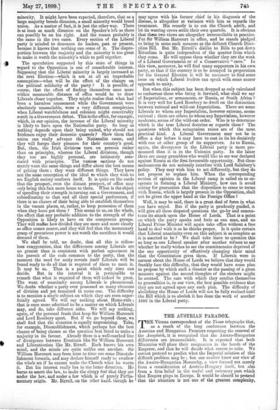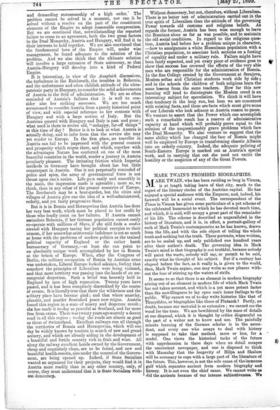THE AUSTRIAN PARADOX. T HE Vienna correspondent of the Times telegraphs
that, as a result of the long conference between the Austrian and Hungarian Premiers respecting the renewal of the Ausgleich, it is recognised that the Austro-Hungarian differences are irreconcilable. It is expected that both Ministries will place their resignation in the hands of the Emperor, and that he will decide what course to take. We cannot pretend to predict what the Imperial solution of this difficult problem mu be ; but our readers know our view of the Austro-Hungarian Monarchy, a view formed not merely from a consideration of Austria-Hungary itself, but also from a firm belief in the useful and necessary part which that Empire plays in Europe. It would be absurd to pretend that the situation is not one of the greatest complexity, and demanding statesmanship of a high order.' The problem cannot be solved in a moment, nor can it be solved without a resolve on the part of the constituent elements of the Empire to adopt reasonable compromises. But we are convinced that, notwithstanding the reported failure to come to an agreement, both the two great factors in the Dual Monarchy, Austria and Hungary, will find it to their interests to hold together. We are also convinced that the fundamental laws of the Empire will, under wise management, be found adequate to the solution of the problem. And we also think that the ultimate solution will involve a large extension of State autonomy, so that Austria-Hungary will develop into a kind of Federal Empire. It is interesting, in view of the Ausgleich discussions, the turbulence in the Reichsrath, the troubles in Bohemia, and the unfortunate and often childish attitude of the ultra- patriotic party in Hungary, to consider the solid achievements of Austria in the field of administration. We are so often reminded of Austria's failures that it is well to con- sider also her striking successes. We are too much accustomed to consider Austria from a purely historical point of view, and with especial reference to her contests with Hungary and with a large section of Italy. But the Austrian quarrel with Hungary and Italy is past and gone ; what need is there to revive old, "unhappy, far-off things" at this time of day ? Better is it to look at what Austria is actually doing, and to infer from that the service she may yet render to Europe. In the first place, no traveller in Austria can fail to be impressed with the general content and prosperity which reigns there, and which, together with the advantages Nature has conferred on one of the most beautiful countries in the world, render a journey in Austria peculiarly pleasant. The irritating friction which Imperial methods in Germany have brought about has but little counterpart in Austria. One is not perpetually reminded of police and spies, the array of governmental force is not thrust upon one's notice. Life go3s easily and smoothly in the main, the impression made is agreeable ; more so, we think, than in any other of the greater countries of Europe.
The Reichsrath may be a bear-garden, but the cities and villages of Austria give one the idea of a well-administered, orderly, and yet fairly progressive State.
But it is in Bosnia and Herzegovina that Austria has done her very best work, which must be placed to her credit by those who loudly insist on her failures. If Austria cannot assimilate Bohemia, if her German population cannot easily co-operate with millions of Slays, if she still finds a modus vivendi with Hungary taxing her political energies to their utmost, if her somewhat aristocratic indolence is not so much at home with the problems of modern politics as the trained political capacity of England or the rather harsh bureaucracy of Germany,—at least she can point to an absolutely unique work accomplished by her in Bosnia at the behest of Europe. When, after the Congress of Berlin, the military occupation of .Bosnia by Austrian arms was undertaken, Liberal Europe looked askance, feeling that somehow the principles of Liberalism were being violated, and that more territory was passing into the hands of an un- congenial despotism. Such a belief was honestly held in England by men of high reputation. Twenty years have passed, and it has been completely discredited by the course of events. It is literally true that there the wilderness and the solitary place have become glad ; and that where anarchy, plunder, and murder flourished peace now reigns. Austria found this region in a state of misery and desperate revolt ; she has made it to-day as peaceful as Scotland, and far more free from crime. There was twenty years ago scarcely a decent road in all this region ; to-day the roads are almost as good as those of Switzerland. Excellent railways run all through the territories of Bosnia and Herzegovina, which will one day be widely known by tourists in search of new and grand scenery, and which are already aiding in the development of a beautiful and fertile country rich in fruit and wine. All along the railway excellent hotels owned by the Government, cheap and exquisitely clean, are to be found, and new and beautiful health-resorts, also under the control of the Govern- ment, are being opened up. Indeed, if State Socialists wanted an argument for their projects, they would find it in Austria more readily than in any other country, only, of course, they must understand that it is State Socialism with- out democracy. Without democracy, but not, therefore, without Liberalism. There is no better test of administration carried out in the true spirit of Liberalism than the attitude of the governing Power towards old customs and religious beliefs. As regards the former, Austria has been wise enough to leave the Bosnians alone as far as was possible, and to maintain the old social conditions. In regard to the religious ques- tion, Austria had before her a problem unique in character, —how to amalgamate a white Mussulman population with a Christian population, to associate both sections on a footing of equality and under a military rule. Failure might have been fairly expected, and yet every piece of evidence goes to show that success has crowned the efforts of the very able men who are responsible for the administration of Bosnia. In the fine College erected by the Government at Serajevo, Moslem softas and Christian students work side by side.; and in the schools the children of both religions learn the same lessons from the same teachers. How far this new learning will tend to disintegrate the Moslem creed is an interesting subject for speculation. We think it will have that tendency in the long run, but here we are concerned with existing facts, and these are facts which must give some of our Liberals who look askance at Austria reason to pause. We venture to assert that the Power which can accomplish such a remarkable result has a reserve of administrative capacity at hand which will probably prove equal to the solution of the unquestionably grave problems which face the Dual Monarchy. We also venture to suggest that the same ability which has changed the face of Bosnia might well be employed by Europe in transforming chaotic Albania into an orderly country. Indeed, the adequate policing of South-Eastern Europe is marked out as Austria's special work, and in carrying that out she need not excite the hostility or the suspicion of any of the Great Powers.







































 Previous page
Previous page